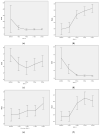Outcomes of an Accelerated Inpatient Refeeding Protocol in 103 Extremely Underweight Adults with Anorexia Nervosa at a Specialized Clinic in Prien, Germany
- PMID: 32438760
- PMCID: PMC7291118
- DOI: 10.3390/jcm9051535
Outcomes of an Accelerated Inpatient Refeeding Protocol in 103 Extremely Underweight Adults with Anorexia Nervosa at a Specialized Clinic in Prien, Germany
Abstract
Background: In mildly to moderately malnourished adolescent patients with anorexia nervosa (AN), accelerated refeeding protocols using higher initial calory supply coupled with phosphate supplements were not associated with a higher incidence of refeeding syndrome (RS). It is unclear whether this is also a feasible approach for extremely malnourished, adult AN patients.
Methods: Outcomes of a clinical refeeding protocol involving a targeted initial intake of ≥2000 kcal/day, routine supplementation of phosphate and thiamine as well as close medical monitoring, were evaluated. A retrospective chart review including AN patients with a body mass index (BMI) <13 kg/m² was conducted, to describe changes in weight, BMI, and laboratory parameters (phosphate, creatine kinase, hematocrit, sodium, liver enzymes, and blood count) over four weeks.
Results: In 103 female patients (age, mean ± standard deviation (SD) = 23.8 ± 5.3 years), BMI between admission and follow-up increased from 11.5 ± 0.9 to 13.1 ± 1.1 kg/m² and total weight gain within the first four weeks was 4.2 ± 2.0 kg (mean, SD). Laboratory parameter monitoring indicated no case of RS, but continuous normalization of blood parameters.
Conclusions: Combined with close medical monitoring and electrolyte supplementation, accelerated refeeding may also be applied to achieve medical stabilization in extremely underweight adults with AN without increasing the risk of RS.
Keywords: anorexia nervosa; caloric intake; refeeding protocol; refeeding syndrome.
Conflict of interest statement
The authors declare no conflict of interest.
Figures

References
LinkOut - more resources
Full Text Sources

